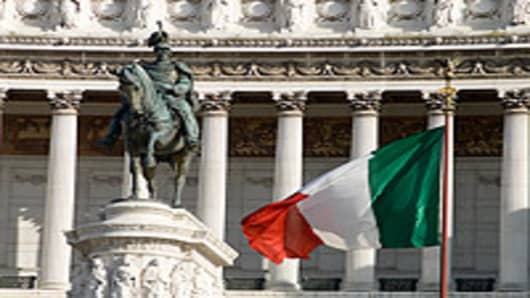The CEO of Italy’s biggest bank told CNBC that despite that country's high debt levels, the country is rich enough to cover its national debt.
“It's a matter of confidence. I don't think the fundamentals of Italy are justifying this overshooting in the market. So, we have problems, the debt is very high but on the other side the debt is only 23 percent of the total wealth of the families so Italy is still quite a rich market,” said Federico Ghizzoni, the CEO of Unicredit during an interview in Milan.
That is not to say that Italy does not have some problems, according to Ghizzoni, whose bank's stock has been battered since the begging of July, when market sentiment turned against Italian government debt and assets. Italy's ability to borrow has only grown more expensive since then.
“We need to reply to a few questions about the market. One is political stability. We have to improve perception in this respect. We need to work further on the budget; I think it would be good to have anticipation of the balance approved for 2012. We need to give signals about the possibility to bring back the country to a growth path. This is a real problem—growth is not yet there,” said Ghizzoni. “I am by nature an optimistic person so I think with this pressure on the market the government and all political institutions will react in a positive way."
The comments came following the release of Unicredit’s second-quarter earnings, which kept the Italian bank on track to meet its full year profit targets and Ghizzoni is confident about his banks holdings of Italian bonds and balance sheet. The bank's earnings more than tripled year-over-year.
Unicredit’s exposure to Italian bonds stands at 40 billion euros, or 5 percent of total assets, and Ghizzoni said recent stress tests by the European Banking Authority had showed that's a good, balanced position.
Having decided against raising capital when many of his rivals did, speculation has been growing about when Unicredit will issue shares to raise money.
“We're not taking any decisions right now. We'll take the decision within our industrial plan. I don't think that the group will go to the market. I don't think the group will have problems," Ghizzoni said. "We have good fundamentals”
He does though think the recent volatility in the stock market, which has seen huge swings in the bank's share price on a daily basis and big losses since June, is unjustified.
“I don't see any connection between the big fluctuations we see in the stock versus an issue like capital. We know that there's this debate about capital with Unicredit, that this will be addressed with our industrial plan, but the fluctuation of 4-5 percent each day up and down that we've seen in the last three, four weeks has nothing to do with the capital issue, ” said Ghizzoni.



